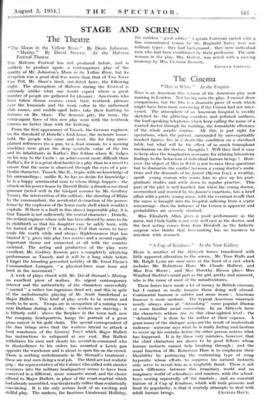STAGE AND SCREEN The Theatre
THE Malvern Festival has not produced before, and is unlikely to produce again, a contemporary play of the quality of Mr. Johnston's Moon in the Yellow River, but its
reception was a good deal less warm than that of You Never ('an Tell, Mr. Shaw's tired, out-dated farce, the following night. The atmosphere of Malvern during the Festival is curiously unlike what one would expect where a great number of people are gathered for pleasure ; Americans who have taken drama courses crack their textbook phrases over the lemonade and the weak coffee in the unlicensed club rooms, and middle-aged ladies take their knitting to lectures on Mr. Shaw. The demonic pity, the irony, the extravagant farce of this new play went with the textbook courses no better than with the knitting.
From the first appearance of Tausch, the German engineer, on the threshold of Dobelle's Irish home, the inchoate house- hold, the people who came and went, the for long unex- plained references (to a gun, to a dead woman, to a mowing machine) were given the deep symbolic value of the inn and its inhabitants in Kafka*s Das Schloss where K. lodges on his way to the Castle : an achievement more difficult than Kafka's, for it is a great deal harder in a play than in a novel to ensure that the scene is observed through the eyes of a par- ticular character. Tausch, like K., begins with no knowledge of his surroundings ; unlike K. he has no desire for knowledge ; he is a happy sentimental man to whom things happen : the attack on his power-house by Darrell Blake, a drunken mystical gunman (acted well in the Gielgud manner by Mr. Geoffrey Toone), the intervention of the military, the shooting of Blake by the commandant, the accidental destruction of the powerL house by the explosion of the home-made shell which wouldn't explode. If there is a fault in this almost impeccable play, it is that Tausch is not sufficiently the central character; Dobelle, the retired engineer whose wife has been allowed by nuns to die in childbirth so that his daughter may be safely born, with his hatred of Right (" It is always Evil that seems to have made life worth while and always Righteousness that has blasted it"), gives this play two centres and a second equally important theme not connected at all with the country satirized. The acting and production of the play were excellent; Mr. Godfrey Kenton gave a completely satisfying performance as Tausch, and it will be a long while before I forget the brooding perverted nobility of Mr. Errol Flynn's Commandant Lanagan, "a physical-force man born and bred in the movement."
A week of plays closed with Mr. David Stewart's Mutiny, an excellent piece of realism. Its urgent contemporary interest and the authenticity of the characters successfully " carried " a rather too ingenious third act, and this in spite of the Melodramatic playing of Mr. Scott Sunderland as Major Hallett. This kind of play needs to be written and needs to be seen. Troops are in occupation of a mining town near Durham during a strike ; the workers are starving ; it is bitterly cold ; above the fireplace in the town hall, now the company headquarters, hangs the portrait of a great gross mayor in his gokl chain. The special correspondent of the Sun brings news that the workers intend to attack a food warehouse of the Grocery Trial which Major Hallett has instructions to safeguard at any cost But Hallett withdraws his men and shoots his second-in-command who in disobedience to his orders has mounted a Lewis gun opposite the warehouse and is about to open fire on the crowd. There: is nothing melodramatic in Mr. Stewart's treatment ; these are real men doing a real job. The third act lost realistic grip ; the representative of the Cabinet who sidled with sinister resources into the military headquarters seems to have been conceived in a different, more romantic mood, and the choice offered to Major Hallett, in place of the court-martial which had already assembled, was theatrically rather than realistically convincing. It is the only serious fault of an exciting and skilful play. The rankers, the facetious Lieutenant Holliday,
the ruthless good soldier" Captain Corcoran (acted with a fine concentrated venom by Mr. Reginald Tate), were not military types ; they had background ; they were individual men who had been conditioned by their profession. The only woman in the play, Mrs. Hallett, was acted with a moving economy by Miss Vivienne Bennett.
GRAHAM CatEr.Nal.






























 Previous page
Previous page